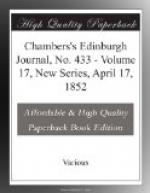As they strayed along the beach, they found, to their joy, a quantity of wood which had been carried in by the tide. What they first got in this way were parts of the wreck of vessels, and afterwards trees, which had been uprooted by the overflowing of rivers, and borne by the waves into the ocean; but what proved a treasure to the poor castaways, were some boards which they discovered on the beach, with a long iron hook, some nails of five or six inches long, and thick in proportion, and other pieces of iron fastened in them—the sad memorials of some shattered vessel. Kind Providence seemed to have directed their steps where help was to be found. Just at the time when their provisions had nearly failed, and when they were without the means of replenishing their store, they perceived, not far from the boards, the root of a fir-tree, which had almost taken the form of a bow. With the help of their knife, they soon brought it into more regular shape, but they were unprovided with a string and with arrows. They determined, in the first instance, to make two lances, to guard themselves against the formidable attacks of the ferocious white bear; but without a hammer, it was impossible to form their heads, or those of the arrows. However, by heating the iron hook, and widening a hole which it happened to have in the centre, with the help of one of the large nails, they inserted the handle, and a round button at one end of the hook, made the face of the hammer. A large pebble served for an anvil, and a pair of reindeer’s horns were the tongs. Such were the tools with which they fashioned the heads for two spears, which they polished and sharpened on stones, and then tied them fast with strips of reindeer-skin to thick sticks, with which they were supplied from the branches of trees which had been wafted on shore. Thus armed, they attacked a white bear, and after a desperate struggle, they succeeded in killing him. They made use of the flesh for food, which they described as being like beef; by separating the tendons, they were supplied with filaments as fine as they pleased, which enabled them to string their bow. Their next work was to form pieces of iron into heads for their arrows, like the spears which they had already manufactured. They polished and sharpened them in the same way, and




